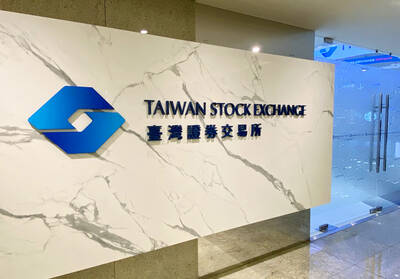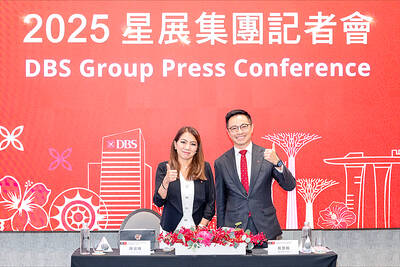Quanta Computer Inc (廣達), which makes servers and laptop computers on a contract basis, yesterday said it expects artificial intelligence (AI) devices to bring explosive growth to Taiwan’s electronics industry, as AI applications are starting to run on edge devices such as AI PCs.
Taiwanese electronics manufacturers such as chipmakers, component suppliers and hardware assemblers are likely to benefit from a rapid uptake of AI applications, Mike Yang (楊麒令), president of Quanta Cloud Technology Inc (雲達科技), a server manufacturing arm of Quanta, told reporters on the sidelines of a technology forum in Taipei yesterday.
“I believe the growth potential is promising once shipments ramp up,” Yang said.

Photo by: Kirill Kudryavtsev, AFP
He said he is optimistic about Quanta’s business growth prospects this year and that the company has clear order visibility for this year and next year.
The company expected to ramp up production of new AI servers powered by Nvidia Corp’s new GB200 processors in September, with a significant portion earmarked for the world’s four major cloud service providers, Quanta said last month.
AI PCs are meant to enjoy “explosive’ growth, as it is an “ideal” edge computing device to handle confidential data and run small language models for businesses, Yang said, adding that it has lower latency compared with cloud-based servers.
The ecosystem is ready to embrace the arrival of AI PCs, Yang said.
Google is building Gemini Nano, the most compact AI model developed by the company, directly into the Chrome desktop client, starting with Chrome 126, Google said at its annual I/O developer conference on Tuesday. That followed the company’s announcement of two Gemma models early this year, which would run on a local device like computers, rather than servers in the cloud.
AI PC shipments are expected to soar to 132 million units in 2026, making up 48.4 percent of overall PC shipments, the Market Intelligence & Consulting Institute (MIC) said.
This year’s shipments would be about 36.65 million units, representing a 15.7 percent penetration rate, MIC said.
Asustek Computer Inc (華碩) said it expects that the AI features on PCs would help usher in a new wave of growth momentum for the whole PC industry, given the much better user experience and productivity improvement, Asustek co-CEO Samson Hu (胡書賓) said at the forum.
It also expects AI PCs to help improve the profitability of the industry, the company said.
An AI PC would deliver a price premium of between US$100 and US$150 per unit, as those machines are equipped with an extra neutral process unit and bigger memory storage, Asustek said.
For electronic component suppliers like Lite-On Technology Corp (光寶科技), AI-enabled hardware from servers to PCs is proving to be a boon.
To meet the higher power consumption of AI devices, the company plans to roll out more high wattage power supply units including 5-kilowatt, 8-kilowatt and even 16-kilowatt power supply units in 2027, Lite-On president Anson Chiu (邱森彬) said.
It produces 3-kilowatt and 5-kilowatt power supply units for AI servers at a factory in Kaohsiung.
Lite-On said it expects strong AI server demand to boost its business this quarter and in the second half, together with the introduction of AI PCs.

Taiwan Semiconductor Manufacturing Co (TSMC, 台積電) secured a record 70.2 percent share of the global foundry business in the second quarter, up from 67.6 percent the previous quarter, and continued widening its lead over second-placed Samsung Electronics Co, TrendForce Corp (集邦科技) said on Monday. TSMC posted US$30.24 billion in sales in the April-to-June period, up 18.5 percent from the previous quarter, driven by major smartphone customers entering their ramp-up cycle and robust demand for artificial intelligence chips, laptops and PCs, which boosted wafer shipments and average selling prices, TrendForce said in a report. Samsung’s sales also grew in the second quarter, up

LIMITED IMPACT: Investor confidence was likely sustained by its relatively small exposure to the Chinese market, as only less advanced chips are made in Nanjing Taiwan Semiconductor Manufacturing Co (TSMC, 台積電) saw its stock price close steady yesterday in a sign that the loss of the validated end user (VEU) status for its Nanjing, China, fab should have a mild impact on the world’s biggest contract chipmaker financially and technologically. Media reports about the waiver loss sent TSMC down 1.29 percent during the early trading session yesterday, but the stock soon regained strength and ended at NT$1,160, unchanged from Tuesday. Investors’ confidence in TSMC was likely built on its relatively small exposure to the Chinese market, as Chinese customers contributed about 9 percent to TSMC’s revenue last

Taiwan and Japan will kick off a series of cross border listings of exchange-traded funds (ETFs) this month, a milestone for the internationalization of the local ETF market, the Taiwan Stock Exchange (TWSE) said Wednesday. In a statement, the TWSE said the cross border ETF listings between Taiwan and Japan are expected to boost the local capital market’s visibility internationally and serve as a key for Taiwan becoming an asset management hub in the region. An ETF, a pooled investment security that is traded like an individual stock, can be tracked from the price of a single stock to a large and

Despite global geopolitical uncertainties and macroeconomic volatility, DBS Bank Taiwan (星展台灣) yesterday reported that its first-half revenue rose 10 percent year-on-year to a record NT$16.5 billion (US$537.8 million), while net profit surged 65 percent to an unprecedented NT$4.4 billion. The nation’s largest foreign bank made the announcement on the second anniversary of its integration with Citibank Taiwan Ltd’s (花旗台灣) consumer banking business. “Taiwan is a key market for DBS. Over the years, we have consistently demonstrated our commitment to deepening our presence in Taiwan, not only via continued investment to support franchise growth, but also through a series of bolt-on acquisitions,” DBS